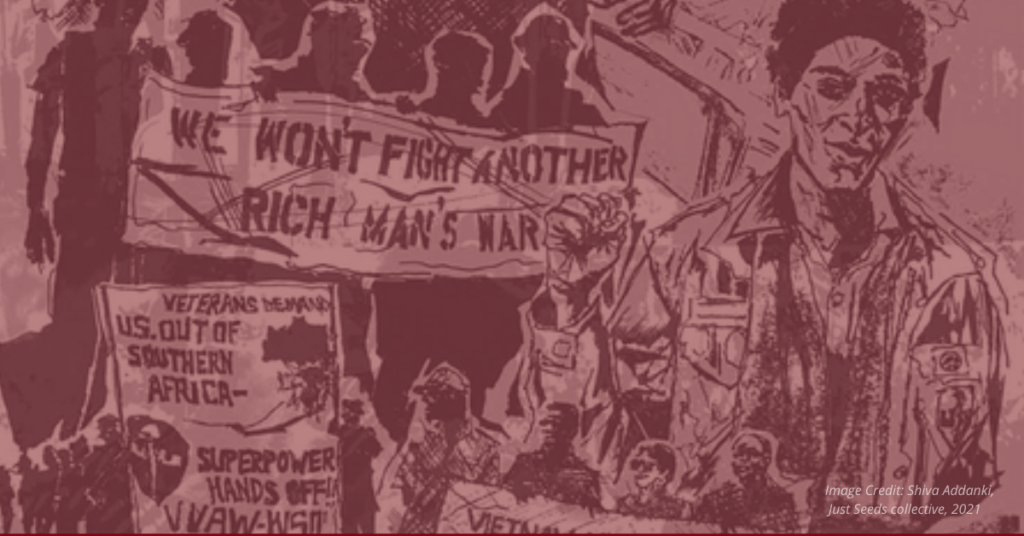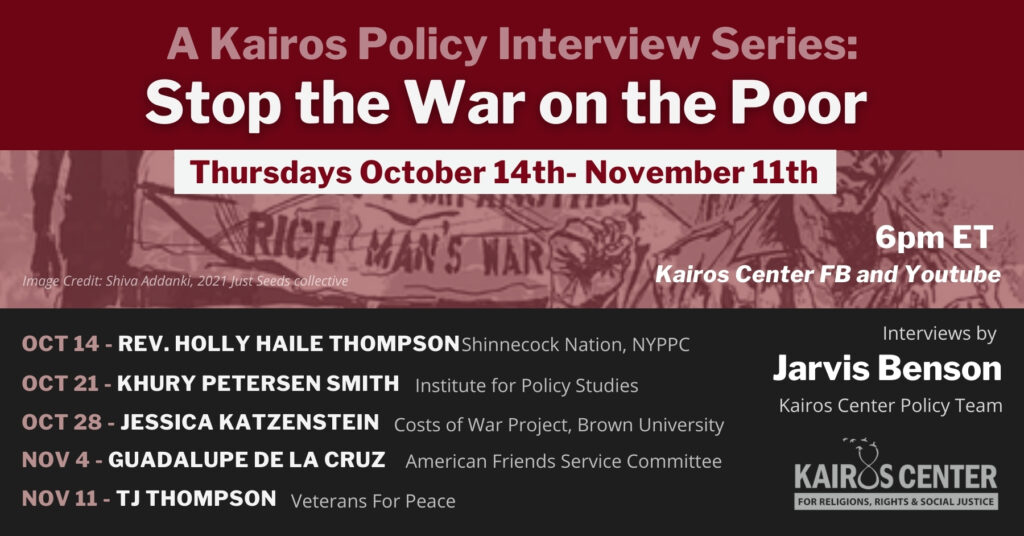
Militarism and violence guided U.S. foreign and domestic policy since the founding of this country. From the genocide of indigenous people to slavery, war, mass incarceration, and beyond, these policies amplify and are sustained by systemic racism and poverty. They have also contributed to the devastation of our planet and natural resources.
Twenty years after 9/11, the War on Terror has crystalized the U.S. into a militarized power both around the world and at home. According to the Institute for Policy Studies, over the past 20 years, the U.S. has spent more than $21 trillion on militarization, surveillance, and repression — all in the name of security — without making any of us, or indeed the world, any safer. Indeed, the COVID-19 pandemic, uprisings against police violence and the persistent economic insecurity facing tens of millions of people reveal the real threats to our safety are not external, but a policy and political framework that continues to deny basic rights and protections to us all, especially poor and low-income people.
This fall, the Kairos Center for Religions, Rights, and Social Justice released a series of webinars with scholars, experts, and organizers on the violent manifestations of US militarism.
International Costs of War
The costs of the global War on Terror have been staggering. Since 2001, about 900,000 lives have been lost to war violence — with many thousands unaccounted for due to the loss of critical infrastructure like hospitals — and 37 million people displaced. In Afghanistan alone, 47,000 civilians have been killed since the start of the War on Terror. In a conversation with Khury Petersen-Smith, we spoke about the dangers of American exceptionalism in perpetuating systems of violence that, in many ways, remain obscure to most of the people living in the US.
”I think it’s genuinely challenging for Americans to know what the US does abroad, even though for people who live around the world, their primary encounter with the US is our military.”
Khury Petersen-Smith, institute for policy studies

Khury Petersen-Smith is the Michael Ratner Middle East Fellow at the Institute for Policy Studies, where he researches the violence that the US carries out and supports, and resistance to it. He focuses on the War on Terror, the militarization of borders, Israeli apartheid, and the struggle for Palestinian freedom.
He said, ”I think it’s genuinely challenging for Americans to know what the US does abroad, even though for people who live around the world, their primary encounter with the US is our military.”
Domestic Militarisation
US militarism is not only a function of foreign policy but very active within our borders, with deployments to the southern border, where 3,000 troops remain today. National Guard soldiers were also deployed to suppress Indigenous-led protests against the Dakota Access Pipeline near the Standing Rock Sioux Reservation, and in June 2020 were called into Washington, DC, to suppress Black Lives Matter protests.
It is also ever-present in our immigration detention system, the largest in the world. Every year, hundreds of thousands of immigrants are locked up in over 200 ICE detention centers, where they often face abusive conditions while they await the determination of their immigration status. A majority of these detention facilities are operated by private, for-profit companies.

As part of this series, Guadalupe De La Cruz, an organizer in Florida with the American Friends Service Committee, speaks to us about her work addressing domestic militarism against immigrants and farmworkers in Florida. Lupe says, “We’re used to being siloed — if you work in immigration, you only think about immigration, but it’s broader than that. You need to think about healthcare, food, ecological devastation, climate, it all.”
Through organizing efforts led by Guadalupe and others, the last few years have brought increased awareness of the militarization of local police forces. The 2020 uprisings in response to the killings of George Floyd, Breonna Taylor, and others have brought the nation’s police forces under close examination. Today, state and local law enforcement agencies are in possession of $1.83 billion worth of military equipment transferred since 9/11, including mine-resistant vehicles, aircraft, drones, military weapons, and ammunition. DoD also transfers equipment to federal agencies including the Department of Homeland Security (DHS) and the Department of Justice (DoJ).

Jessica Katzenstein is a PhD candidate in the Department of Anthropology at Brown University. Her research traces how police officers absorb and resist reforms during a mounting legitimacy crisis, in order to understand why reforms perpetually fail to realize their promises. Drawing on 16 months of ethnographic fieldwork with officers and reformers in Maryland, she demonstrates how the everyday labor of policing makes reform efforts into a “productive failure” by translating them into police terms. Jessica’s work is grounded in sustained engagement with Baltimore, where she worked and volunteered for various social justice nonprofits such as the Identity Clinic. She has written about and presented on the links between U.S. police militarization and the post-9/11 wars for the Costs of War Project, and her research has been supported by National Science Foundation grants and by the Center for Engaged Scholarship. Jessica has written an important report on the militarization of U.S. policing called The Wars Are Here: How the United States’ Post-9/11 Wars Helped Militarize U.S. Police which has been published by the “Costs of War Project” at the Watson Institute at Brown University.
During our chat we learned more about the history of police militarization, focusing on the transfer of military-grade equipment and resources to local police units across the country. She tells us that we must push back against “this idea that the police and the military are separate and separable in any meaningful way. Harm reduction is extremely important, but behind that has to be the recognition that these are not separable institutions.”
Veterans
Civilians are not the only group affected by our US militarism. The 19 million veterans in the U.S, 3.5 million of whom served during the Global War on Terror, are also caught in this web of violence. Of the $14 trillion the Pentagon has spent over the last 20 years, less than one-quarter – $3.3 trillion – went to compensation for military personnel. Entry-level pay for an enlisted service member in 2021 was just over $20,000, the equivalent of a $10.30 hourly wage. Veterans of the War on Terror have been subject to nonstop deployments over the last 20 years, taking a toll on their physical and mental health, family stability, and civilian career opportunities. Veterans suffer from high risks of suicide, homelessness, and family violence, among other long-lasting consequences of war.

T.J. Thompson is a veteran of the U.S. Navy, enlisted from 1998–2004. He was stationed on board USS Portland, LSD-37 from 2000–03 and deployed to Europe in the Mediterranean Sea, South America, and in support of the Global War On Terror to the Persian Gulf in early 2003. Thompson was raised in Chesapeake, VA where he currently resides with his family and is a community and national organizer volunteering as an advocate with groups including the Poor People’s Campaign, About Face: Veterans Against the War, Veterans for Peace, and Drug Policy Alliance . He has worked directly with the U.S. House and Senate on marijuana policy reform for veterans and currently engages in ongoing work locally with Hampton Roads Poor People’s Campaign. T.J. is in the process of a Masters Degree in Humanities at Old Dominion University with an emphasis in critical cultural analysis. TJ tells us, “We should be fighting for a complete overhaul of the military, Pentagon, defense spending, contractor spending. There is a lot of waste and abuse of this military spending.”
Military Spending
We know it doesn’t have to be this way. The US could redirect military spending – and the greater resources that have been spent militarizing our society – to meet the critical challenges that have gone neglected for the last 20 years:
- $4.5 trillion could fully decarbonize the U.S. electric grid
- $2.3 trillion could create 5 million $15 per hour jobs with benefits and cost-of-living adjustments for 10 years
- $1.7 trillion could erase student debt
- $449 billion could continue the extended Child Tax Credit for another 10 years
- $200 billion could guarantee free preschool for every 3-and-4-year old for 10 years, and raise teacher pay
- $25 billion could provide COVID vaccines for the population of low-income countries
These redirected resources would begin to move us out of the reign of terror that has been unleashed over the past twenty years, and towards a society that nurtures and protects life, our communities, and our planet.

The Rev Holly Haile Thompson, DD, a blood member of the Shinnecock Nation, Long Island, NY, spoke to us about the deep impact militarism has had on indigenous communities. She became the first Native American Woman to become Minister of Word and Sacrament/Teaching Elder in the Presbyterian Church (USA). Holly taught PCUSA Polity at Cook College and Theological School in Arizona served congregations in Colorado and in New York State, and is a member of several churchwide committees including the Racial Equity Advocacy Committee (REAC), the Native American Consulting Committee (NACC), and the Doctrine of Discovery Speakers Bureau, all of the PCUSA. Currently, Holly volunteers with the United Methodist Church’s northeast Native American Ministries Committee – supporting the UMC ongoing ‘Act of Repentance’. Although Holly was Honorably Retired in 2011, she most recently concluded her service with 1st Presbyterian Church Potsdam, NY as Transitional/Supply Pastor to explore what an “Anti-Racist Church” might look like. She works with the Poor Peoples’ Campaigns of Northern New York and of Long Island. Holly is married to Kahetakeron Harry Thompson of Akwesasne, and together they share 7 children, 16 grandchildren, and 6 great grandchildren.
Rev. Holly Thompson spoke to the South African Apartheid state. She says, “One day the word was “This Apartheid will end”. It was not a matter of “let’s wait and see”. It was, “Today this ends”. I think that’s what we have to do as people who are working for justice. We need justice and we need it across the board.”
To begin addressing this issue, we must recognize that militarism is connected to the structural issues of systemic racism, poverty, and ecological devastation. Addressing these inter-related injustices will take more than a set of policies or legislation – it will take a reorientation of our national priorities. This is what the Poor People’s Campaign: A National Call for Moral Revival has called a “Third Reconstruction,” drawing on the history of the First Reconstruction following the Civil War and the Second Reconstruction of the 20th-century civil rights movement. Given the nature of these crises today, a Third Reconstruction must center those most impacted by these injustices to life the whole of society.
Watch this series on Facebook and Youtube.
